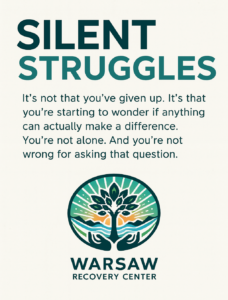You never think it’ll be your child. You never picture yourself here, reading blog posts from a treatment center, trying to weigh the cost of something that could change—or even save—your child’s life. But here you are. Not because you failed. But because you love so hard, it hurts.
If your young adult has relapsed, is spiraling again, or won’t even admit there’s a problem, the question you might be asking is painfully simple: Is residential treatment actually worth it?
As a parent, you’ve likely done everything you can think of. And now you’re standing at a cliff’s edge, wondering if this next step is the leap—or the lifeline.
When You’ve Tried Everything Else and Still Feel Alone
This isn’t your first sleepless night. This isn’t the first time you’ve Googled options. And it’s probably not the first time you’ve watched your child promise change—and then slowly fall apart again.
Maybe they’ve been to therapy. Maybe they’ve tried outpatient. Maybe you’ve done all the “right” things: boundary-setting, support groups, tough love, open-hearted talks. But nothing sticks. The cycle starts over. And with each turn, it wears you down just a little more.
It’s not that you’ve given up. It’s that you’re starting to wonder if anything can actually make a difference.
You’re not alone. And you’re not wrong for asking that question.
hat a Residential Treatment Program Actually Offers
Residential treatment isn’t just about removing substances—it’s about rebuilding the person underneath. At Warsaw Recovery Center, our residential treatment program offers something most outpatient settings can’t: full-time, immersive care in a safe, structured environment.
Here’s what that looks like in real terms:
- 24/7 clinical and emotional support
- Daily therapy, skill-building, and reflection time
- Time and distance from familiar triggers and enabling environments
- A community of peers and staff who understand and can hold real accountability
This isn’t a hospital. It’s not a lockdown. It’s a place designed to give your child the time, tools, and trust required for deep healing. And often, it’s where the story finally starts to turn.
It’s Not “Too Much.” It’s the Right Size for This Pain
Many parents hesitate to consider residential treatment because it feels drastic. There’s a voice inside that says, What if I’m overreacting? What if they just need another chance? That voice is understandable—and it’s not wrong to question.
But here’s another perspective: if your child had cancer and previous treatments weren’t working, you wouldn’t feel guilty exploring something more intensive. You’d want to give them every possible shot at getting better.
Addiction and mental health disorders are just as real. They require care that matches the complexity of the need. Residential treatment isn’t “too much.” It’s appropriate, intensive care—for a situation that’s likely already been urgent for a long time.

How Families Stay Involved Without Feeling Overwhelmed
At Warsaw Recovery Center, we know your role doesn’t stop when your child walks through our doors. That’s why family involvement is part of our core approach.
We offer:
- Weekly family therapy sessions (virtual or in-person)
- Educational workshops on codependency, communication, and relapse prevention
- Regular updates and check-ins from your child’s treatment team
We also offer support just for you. Because your healing matters too. And often, the most sustainable outcomes happen when both the individual and their family are supported—emotionally and practically.
Being involved doesn’t mean micromanaging their process. It means learning how to support without overextending. It means staying grounded, even when they’re struggling. And it means knowing you’re not alone in this anymore.
Can This Actually Work—Even If They’ve Relapsed Before?
Yes. But not because this is a magic solution. It works because it meets your child where they are—not where you wish they were.
Relapse isn’t failure. It’s often a signal that more intensive care is needed. And sometimes, the structured container of a residential treatment program is what finally allows a person to slow down, feel safe, and begin the hard work of lasting recovery.
Our team doesn’t treat your child like a number or a diagnosis. We treat them like a human being whose pain has outpaced their ability to cope. And we build from there—with empathy, strategy, and realism.
Whether this is your child’s first time in treatment or their fifth, it’s not “too late.” Healing is not linear. And every person deserves a place to try again—with support that actually fits.
When You Bet on Hope, You Deserve Real Options
We know this isn’t an easy decision. Financially. Emotionally. Spiritually. But this isn’t about luxury or appearances. It’s about life. It’s about reclaiming the possibility that your child’s story isn’t over yet.
At our residential treatment program in Virginia, we walk families through every detail—admissions, insurance, timelines, aftercare. No pressure. Just transparency.
Because when you’re betting everything on love, you deserve to know exactly what’s on the table.
Frequently Asked Questions About Residential Treatment for Young Adults
How long is a typical stay in a residential treatment program?
Most stays range from 30 to 90 days depending on clinical needs, progress, and insurance coverage. Some individuals may benefit from a longer stay based on their situation.
What if my child doesn’t want to go?
That’s common—and it doesn’t mean treatment won’t work. We can help families navigate this conversation, and often a pre-admission assessment helps clarify options. Resistance can soften once safety is felt.
Can I visit or talk to my child during treatment?
Yes. We offer family sessions, phone check-ins, and visitation guidelines that support both connection and healing boundaries. Every step is intentional.
Will my child be safe during treatment?
Safety is foundational. Our program offers round-the-clock supervision, trauma-informed care, and a highly trained staff to handle emotional or behavioral challenges with compassion and skill.
How much does residential treatment cost?
Costs vary by length of stay and insurance coverage. We work with many insurance providers and offer guidance through the financial process. Our admissions team is transparent and supportive at every step.
We’re Here When You’re Ready
Call (888) 511-9480 or Contact Us to learn more about our residential treatment program services in Warsaw, Virginia. Whether it’s your child’s first chance or their fifth, we’re ready to make it count—with you.

